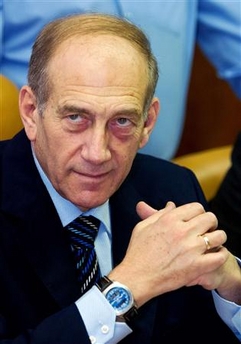Israeli Prime Minister Ehud Olmert holds talks at the Pentagon and White
House on Tuesday, seeking during his first visit to Washington to coordinate
policy on the Palestinians and the Iranian nuclear crisis.

Israeli Prime Minister
Ehud Olmert opens the weekly cabinet meeting at his Jerusalem office May
21, 2006. [Reuters] |
Olmert's meeting with Defense Secretary Donald Rumsfeld will provide an
opportunity to exchange assessments about Tehran's uranium enrichment program,
which both the United States and Israel fear could lead to a nuclear-armed Iran.
"I don't want to go into details," a senior Israeli official said about
planned discussions on Iran. "I can tell you that the coordination we had in the
past is going to continue and probably improve."
Israel, the only nuclear power in the Middle East, has said it wants to take
a back seat in international diplomatic efforts to resolve the Iranian crisis
but views seriously Iranian President Mahmoud Ahmadinejad's calls for its
destruction.
Olmert, who took over from Ariel Sharon after the Israeli leader suffered an
incapacitating stroke in January, had dinner on Monday with U.S. Secretary of
State Condoleezza Rice to prepare for his meeting with President George W. Bush.
No major decisions are expected: Olmert's "convergence" proposal to reshape
the Jewish settlement map in the occupied West Bank is still largely on the
drawing board.
Senior U.S. officials said Bush will be hesitant to embrace Olmert's ideas
until he is convinced that what he proposes will not prejudice the outcome of
eventual final-status talks between Israel and the Palestinians.
Under his West Bank plan, Olmert intends in the absence of a Palestinian
peace partner to remove isolated Israeli settlements in the territory, bolster
major enclaves Israel says it intends to keep forever and set a border by 2010.
Olmert has said he prefers a negotiated agreement with the Palestinians but
peace hopes have dimmed since the Islamic militant group Hamas took power in
March after crushing moderate Palestinian President Mahmoud Abbas' Fatah faction
in a January election.
Gun battles between rival Palestinian groups in Gaza have also clouded
prospects for resuming peacemaking.
ABBAS
Washington wants Olmert to try to negotiate first with Abbas. Olmert, elected
prime minister in March, has agreed to talk with him but says the Palestinian
leader is powerless while Hamas is in charge.
Abbas "said after the (Palestinian) election he would dismantle the terrorist
organizations -- there would be one gun, one government, one rule," the senior
Israeli official said. "Fine -- start."
Israel's ambassador to Washington, Danny Ayalon said an Olmert-Abbas peace
summit was not on the agenda for Tuesday's talks in Washington.
"What is being discussed is the internal Palestinian situation, how it
affects the chances of advancing toward a peace settlement," Ayalon told Israel
Radio by telephone.
Palestinians have condemned the proposed Israeli go-it-alone steps as an
attempt to annex land and deny them a viable state.
The plan could also spell the end of a peace "road map" Bush and the European
Union have championed as a blueprint for negotiations and establishment of a
Palestinian state alongside a secure Israel.
Israeli officials say that putting Olmert's plan into motion will be a
gradual process. Weakened politically by an unpopular war in Iraq, Bush also
seems unlikely to embark on a new Middle East diplomatic venture any time soon.
Olmert "needs to convince the United States ... that we exhausted all
opportunities and that there's nothing else, and we have to go for this
unilateral disengagement," one Israeli official said.